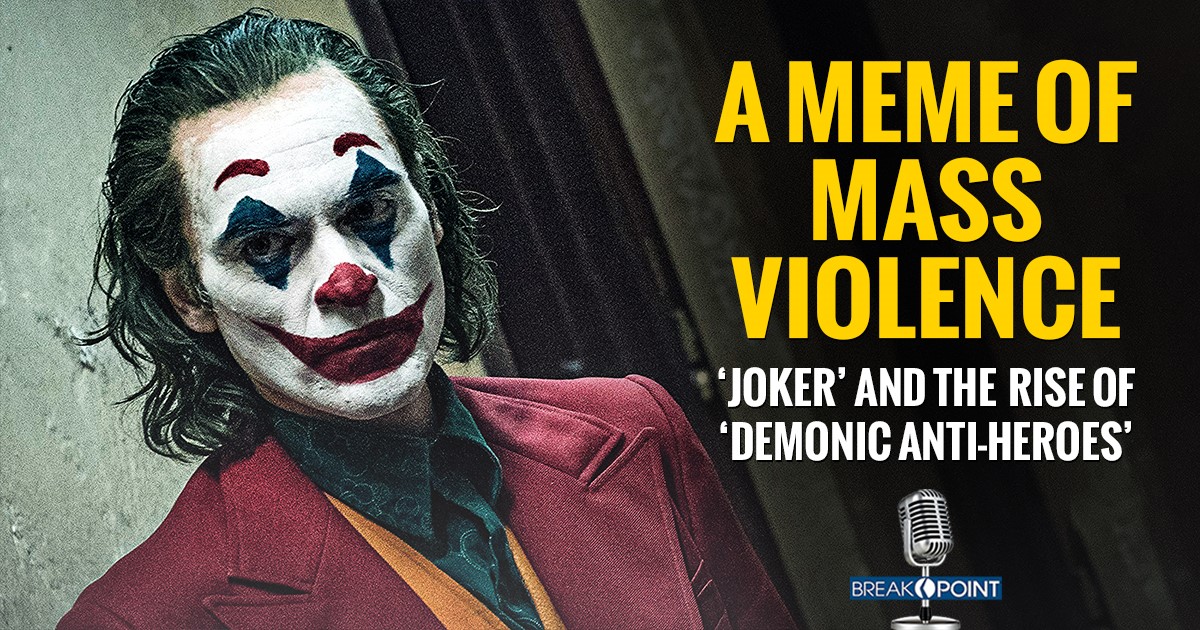


Batman’s arch-nemesis is back on the silver screen in full face paint and purple suit, along with the uncomfortable questions his character raises about the state of our culture.
Joaquin Phoenix is the new “Joker,” this time in an origin story about the comic book villain who, until now, didn’t have one. The trailers for this movie make it look more like an art-house film than a superhero movie. While Marvel movies like to pack on the laughs, this one is too deadly serious to put a smile on anyone’s face.
The film’s spotlight is fully on the Joker, who at last has a name: Arthur Fleck—a failed comedian who loses his mind and leads a murderous October Revolution-style uprising in Gotham City.
This iteration is, of course, being compared with Heath Ledger’s chilling performance from “The Dark Knight” (2008). Certainly, the nihilistic angle of Ledger’s Joker was more than a few steps further down into depravity than Jack Nicholson’s portrayal in the first Batman film. And, when Ledger died of a drug overdose before the film’s release, many speculated the character had consumed him.
Adding to this twisted plot is that the perpetrator of the Aurora, Colorado, theater shooting, with his dyed, clownish hair and deranged expression, targeted the opening weekend of the 2012 sequel to “The Dark Knight.”
No wonder authorities were on alert last weekend as the new “Joker” movie opened. Both the FBI and LAPD issued warnings about potential online threats, and police forces around the country beefed up security around theaters. Warner Brothers even reminded audiences that their movie isn’t an endorsement of mass-violence, and that the Joker is not a hero to be emulated.
Thank God, the opening weekend was uneventful. But the very fact that we breathed this collective sigh of relief over a movie shows what a meme of mass-violence the Joker has become.
This criminally psychotic clown has taken on a life of his own, and ever-darker depictions on-screen have reinforced it. Movie by movie, the villain we’re supposed to hate and fear seems to be edging out Gotham’s Dark Knight on center stage, spreading fear of senseless killing in the real world—a world where, tragically, such crimes are already far too common.
The very existence of a Joker origin film reminds me of something C. S. Lewis wrote in the opening of “The Screwtape Letters”: “There are two equal and opposite errors into which our race can fall about the devils,” he explains. “One is to disbelieve in their existence. The other is to believe, and to feel an excessive and unhealthy interest in them.”
Writing at Christ and Pop Culture, K. B. Hoyle argues our kind of interest in the Joker is that kind of unhealthy. She compares our culture’s growing fascination with bad guys to the sympathy some feel for John Milton’s tragic Satan in “Paradise Lost.”
But this trend is much more recent. In his book, “Shows About Nothing,” Thomas Hibbs identifies the rise of what he calls “demonic anti-heroes.” These characters—whether we’re talking about Anthony Hopkins as Hannibal Lecter, Tom Hiddleston as Loki, or Angelina Jolie as Maleficent—invite us to do more than pity evil. They invite us to root for or even identify with it. And it’s not just the supernatural evil heroes stealing our cultural support, as “Ocean’s Eleven” and all of its derivatives amply demonstrate.
Of course, such movies get made because they sell. “Joker” has already broken box office records for October. Having not seen it yet, I can’t say what its real moral message is.
But I have seen “The Dark Knight” and, despite Heath Ledger’s incredible performance, his Joker—like Milton’s Satan—is not the intended hero. The fact that so many received the character as a hero says a lot about our culture. It betrays a culture-wide fascination with evil we now bring to the theater.
It’s a fascination that’s long since crossed over into what Lewis called “unhealthy and excessive,” and the real-world consequences of our collective inability to tell good guys from bad guys are no joke.
Have a Follow-up Question?
Up
Next

Related Content

© Copyright 2020, All Rights Reserved.














